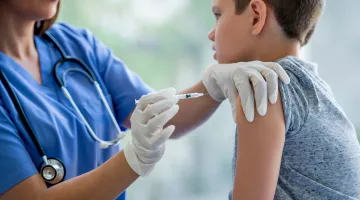The Hidden Impact of Concussions in Children
Author

South Shore Health
Though concussions can happen at any age, it is estimated that more than three million children, aged 18 and younger, sustain a traumatic brain injury each year—80 to 90 percent of which are mild.
The rise in high-impact youth sports has made our children more susceptible to head injuries and brain trauma than ever before.
While it has been a hot topic of conversation in recent days with regard to professional athletes, concussions are a concern for players at both the professional and student athlete level. In fact, any head impact on or off the field that causes trauma to the brain can result in a concussion.
What is a Concussion?
The term concussion is used interchangeably with the term mild traumatic brain injury (TBI).
A mild TBI or concussion is a disruption in the function of the brain as a result of a forceful blow to the head, either direct (such as hitting your head on or against something); or indirect (such as whiplash).
The impact causes the brain to shuffle back and forth within the skull.
How Are Concussions Diagnosed?
Diagnosing a concussion can be both complicated and confusing. Often, children, teens and athletes of any age or level may be hesitant to admit the possibility of a concussion, either because the effects are so subtle or because they want to return to their normal activities as soon as possible. Since there’s no simple test for diagnosing a concussion, a complete history and physical exam is an important first step. In some cases, basic neurological testing can help diagnose a mild TBI, though it is less common and would only be used to rule out a more serious injury, like bleeding inside the skull.
“Taking a history of what happened to the patient is an important first step in the diagnosis and treatment of a concussion,” said Gina Boutwell, MD, pediatrician at South Shore Health.
The pediatric concussion team at South Shore Health provides specialized assessment and concussion management to current pediatric patients—approaches that are necessary to get student-athletes back to playing as quickly as possible.
“Five years ago we saw an opportunity to start our own program when we began noticing an influx in student-athletes coming in with head injuries, typically sustained from a high-impact sport,” said Molly Mazenec, Pediatric Nurse Practitioner at South Shore Health. “We realized instead of sending these patients elsewhere for assessment and intervention, we in fact had the expertise to pioneer our own head injury program.”
Symptoms to Watch For
One common misconception is that people who suffer a concussion will pass out or lose consciousness. Not everyone with a head injury will lose consciousness. When injuries happen on the field during youth or high school sports, it’s important that coaches, parents and athletes don’t try to judge the severity of the injury without a health care provider’s assessment before returning to play.
“My golden rule of advice is: when in doubt…pull them out," said Molly. “We have a protocol in place—when patients call with a head injury, we immediately loop them into our head injury program.”
While not every hit is a concussion, it’s important to report all symptoms to a health care provider, including:
- Headache—different from regular head pain caused from a bump or bruise, but instead lingers on after the day of the injury.
- Dizziness
- Trouble falling asleep or staying asleep
- Sensitivity to noise or light
- Feeling foggy or “out of it”
- Balance issues
It is typical for concussive symptoms to become worse in the first 72 hours after an injury. If the child experiences any of the symptoms listed above, it is imperative to seek immediate medical attention, where the provider will likely do a series of tests which can indicate how serious the head injury is. A comprehensive plan to address an athlete’s return to play is necessary and may involve days, weeks or even months. Your child's doctor will make a recommendation based on the circumstances.
The good news is that children who sustain a concussion almost always recover completely in a relatively short period of time—an estimated 85 percent within three weeks if they follow the recommendations given to them by the concussion clinic.
Baseline Concussion Testing
Along with the comprehensive concussion management program for current pediatric patients, South Shore Medical Center also offers a Saturday clinic in both locations for ImPACT baseline testing. The testing is not used as a diagnostic tool or to determine the severity of concussion. Instead it allows the concussion clinic to compare your child’s ImPACT score pre-injury to where they are post-injury, very helpful to determine when return to play is safe.
“The test is used as a tool in concussion management so that we know when a child is better,” said Dr. Boutwell. “When we have their own baseline impact study, the post concussive testing lets us know when a child is ‘back to their baseline.’”
Learn more about Primary Care at South Shore Health.
Author

South Shore Health






